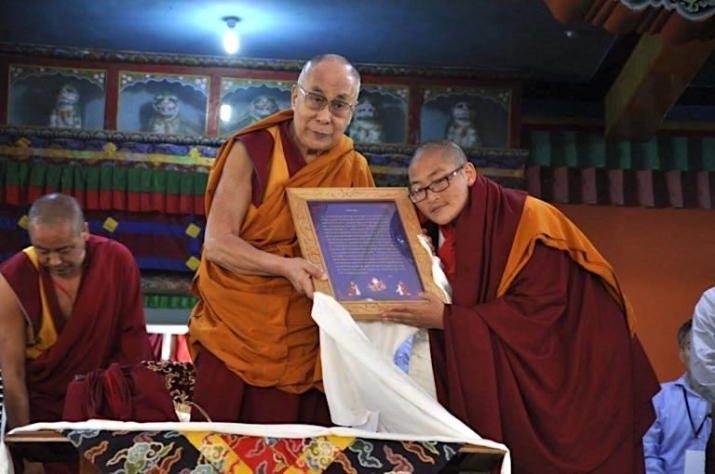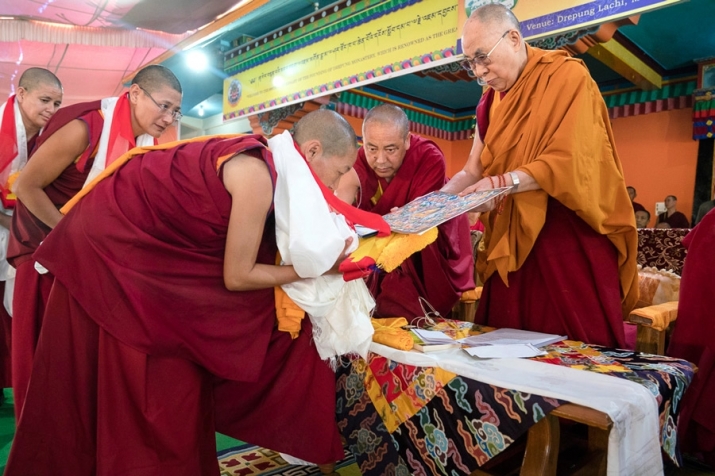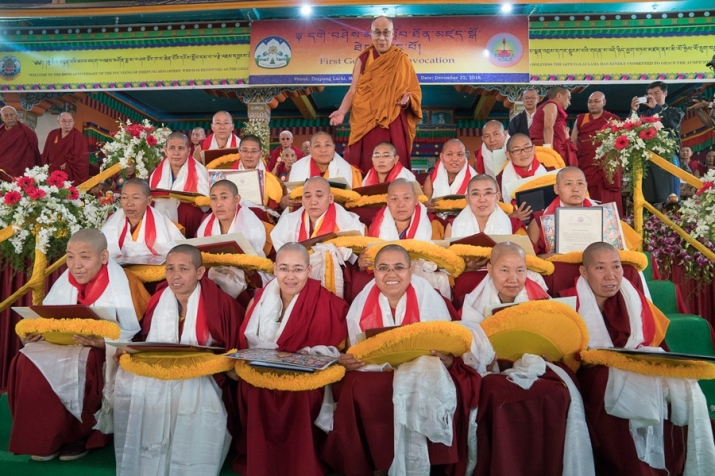NEWS
Dalai Lama Awards Historic Geshema Degrees to 20 Nuns
 A nun receives the Geshema degree from His Holiness the Dalai Lama. From phayul.com
A nun receives the Geshema degree from His Holiness the Dalai Lama. From phayul.comTwenty women made history at Drepung Loseling Monastery in Mundgod, in the southern Indian state of Karnataka, on 22 December, becoming the first Tibetan Buddhist nuns to be awarded the title Geshema in recognition of attaining the highest academic degree in Tibetan Buddhism. His Holiness the Dalai Lama conferred the degrees during a convocation ceremony that represented the culmination of a long-held aspiration of the Dalai Lama and His Holiness the Karmapa, both of whom have advocated the establishment of a Geshema program for many years.
“As I mentioned yesterday, there were some people who were not keen on our using the term Geshema for this degree,” the Dalai Lama noted at the ceremony. “But I’ve observed you debate, you’ve studied hard and achieved high standards. You’ve qualified for this degree. I congratulate you.” (The Office of His Holiness the Dalai Lama)
Geshe (feminine: Geshema) is an academic degree for monastics equivalent to a doctorate in Buddhist philosophy. The qualification is emphasized primarily by the Gelugpa lineage of Vajrayana Buddhism, but is also awarded in the Sakyapa school. The annual Geshema examination has been held only since 2013—until 2011, the Geshe title was awarded only to monks. Nuns who successfully pass the degree are qualified to take on leadership roles in monastic and lay communities that were previously reserved for males.
In his keynote speech, the Dalai Lama emphasized the importance of gender equality in education as well as the need to make modern education more holistic. “Through the power of education, women have been able to rise up to prominent roles including leadership in various societies,” His Holiness said. “Education has played a big role in the advancement of gender equality and material development. However, when you think about secular ethics like compassion, modern education is still not sufficient. Science tells us that women are biologically more compassionate. Education should instill compassion. We should focus on secular ethics. The world needs a uniform outlook at compassion and women are innately inclined to instill compassion.” (The Tibet Post International)
“The other day, I was impressed by a group of monks reciting Nagarjuna’s Fundamental Wisdom by heart,” His Holiness observed. “I’ve talked elsewhere about specialization in the pursuit of further studies. You might choose to study the position of the Mind Only or Prasangika schools more closely, or take up some specialized investigation of the works of Dignaga and Dharmakirti. Alternatively, the Dalai Lama Institute for Higher Education near Bengaluru has just announced the launch of its PhD program in association with the University of Mysore, which you could join.” (The Office of His Holiness the Dalai Lama)
 The Dalai Lama presents degree certificates to each of the 20 nuns. Photo by Tenzin Choejor. From dalailama.com
The Dalai Lama presents degree certificates to each of the 20 nuns. Photo by Tenzin Choejor. From dalailama.comThe examination process is extremely rigorous, taking four years in total. The nuns must undergo oral and written examinations, during which they are tested on the entirety of their 18-year course of study. The success this year of the 20 nuns therefore marks a new chapter in the development of education for female monastics and for Tibetan women.
“I am extremely happy and proud to be one of the first Geshema degree holders in history,” remarked Namdol Phunstok from Kachö Gakyal Ling at Kopan in Nepal. “I am grateful to His Holiness the Dalai Lama for making it possible for us to attain this degree on this historic occasion.” (The Tibet Post International)
The Geshema exams were carried out under the supervision of the Board of Geshema Examination, which is comprised of representatives from the Department of Religion and Culture, non-profit organization the Tibetan Nuns Project, the Institute of Buddhist Dialectics in Dharamsala, and six nunneries in India and Nepal.
“Educating women is powerful,” Rinchen Khando Choegyal, founder and director of the Tibetan Nuns Project, which supports seven Buddhist nunneries in India, said in July, when the 20 nuns successfully passed their degrees.* “It’s not just about books. It is also about helping nuns acquire the skills they need to run their own institutions and create models for future success and expansion. It’s about enabling the nuns to be teachers in their own right and to take on leadership roles at a critical time in our nation’s history.” (Tibetan Nuns Project)
The Tibetan Nuns Project, established under the auspices of the Tibetan Women’s Association and the Department of Religion and Culture of the Central Tibetan Administration, supports almost 800 nuns from all Tibetan Buddhist lineages living in nunneries and elsewhere in India. Many of the nuns are refugees from Tibet, but the organization also reaches out to the Himalayan border areas of India where women and girls have had little access to education and religious training.
 His Holiness poses with the 20 nuns. Photo by Tenzin Choejor. From dalailama.com
His Holiness poses with the 20 nuns. Photo by Tenzin Choejor. From dalailama.comThe title Geshe was first bestowed upon masters of the Kadampa tradition, such as Geshe Chekawa Yeshe Dorje (1102–76). The degree represents the highest form of training in the Gelugpa school of Tibetan Buddhism. The first female monastic to qualify for the Geshema title was German nun Kelsang Wangmo, who was ordained in India and spent 21 years in training before receiving the Geshema title in 2011.
* Twenty Tibetan Nuns Make History by Passing Geshema Degree (Buddhistdoor Global)
See more
Ceremony to Award Nuns the First Geshe-ma Degrees & Golden Jubilee of CST Mundgod (The Office of His Holiness the Dalai Lama)
Tibetan leader awards historic Geshema degree to twenty nuns (The Tibet Post International)
Dalai Lama presides over historic convocation for first batch of Geshemas (Phayul.com)
In a first, 20 Tibetan Buddhist nuns awarded Geshema degree (Tibet Sun)
In a first, female Buddhist monks awarded doctorates (Deccan Herald)
Tibetan Buddhist Nuns Make History: Congratulations Geshema Nuns! (Tibetan Nuns Project)
Related news from Buddhistdoor Global
His Holiness the Dalai Lama to Award Historic Geshema Degrees Next Week
Twenty Tibetan Nuns Make History by Passing Geshema Degree
Annual Geshema Examinations Held in Dharamsala
Nuns in Dharamsala Participate in Winter Debate before the Dalai Lama
Related features from Buddhistdoor Global














